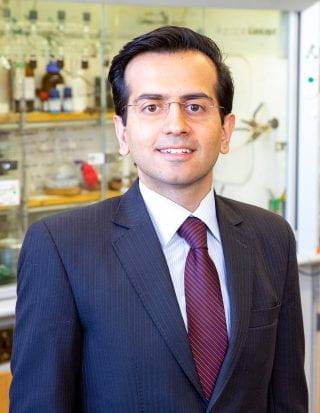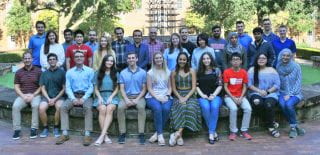A Q&A with Chemistry and Biochemistry’s Hudson Beyzavi

Hudson Beyzavi, Fulbright College faculty
Hudson Beyzavi, Ph.D.
Assistant Professor in the Department of Chemistry and Biochemistry
In this conversation, Beyzavi shares his passion for cancer treatment research, the breakthroughs in his lab’s research that could lead to more effective chemotherapy treatment, his joy in inspiring students and giving them the opportunity to conduct research, and how much he’s enjoying making Northwest Arkansas his new home.
Q: Tell us a little about your research, academic passions and/or role within the college. What excites you about this?
Cancer treatment and diagnosis using nanotechnology is the major direction of the Beyzavi Group.
Cancer is the second most common cause of death in the U.S.; a fact that has influenced me to work hard to contribute in the field of cancer therapy and diagnosis, as I have seen many families that have adversely been affected by cancer.
I strongly believe that the mortality rate can be often greatly reduced by early diagnosis and therapy using nanotechnology. That is why it has been a goal in my life to attack cancer using the Targeted Cancer Imaging and Therapy approach, which is among the hot topics in cancer research.
About my role and background, I earned my doctoral degree by working on photosensitizer drugs for photodynamic therapy (PDT), a modern approach to cure cancer. I then joined Northwestern University as a postdoctoral awardee working on nanomaterials under the guidance of professors Sir Fraser Stoddart (2016 Nobel Prize Laureate) and Joe Hupp.
Afterwards, I accepted an offer from Harvard University and Massachusetts General Hospital where I worked as a research associate leading Ritter Group working on positron emission tomography (PET) tracers for different imaging applications such as cancer imaging.
Q: How long have you been at Fulbright College? What have you enjoyed most about your time here?
I joined the University of Arkansas in fall 2017 as an assistant professor in the Department of Chemistry and Biochemistry. I am also affiliated with Cell and Molecular Biology Program, as well as the Materials Science & Engineering Program.
It is not even a year after I have joined University of Arkansas that my research has been successful in the discovery of several cancer drug candidates which outperform the currently commercially available drugs, namely cisplatin, based on our initial studies.
Our research has also been recently highlighted regarding our NIH Grant on PET Imaging, and our discoveries on Platinum- and Gold-based Anticancer Drug Candidates, and Anticancer Nano Drug Candidates.
Q: What do you most hope your students remember from their classes and/or interactions with you?
Being hard working and goal-oriented are among the characteristics that my students either in my research lab or my class have been inspired to display by interacting with me.
I always try to come up with innovative approaches to teach my students how to be an out-of-the-box thinker and solve the challenges in research and problems in the textbooks and exams.
I encourage them to work hard and believe in themselves and have high self-confidence to solve challenges and problems.
Q: What do you like to do during your time outside of the university?
I am new to Northwest Arkansas, so I love to meet new people and make a good network of friends in NWA.
I like nature and I think NWA is the sweet spot to do a lot of outdoor activities. I love to hike, canoe/kayak, and camp. I ride my bike every day to work and bike to Lake Fayetteville over the weekends early in the mornings.
I am also a world traveler and always save some time to travel overseas, mainly to Europe. I also would like to have a couple of pets to hang out and play with.
I have found NWA has very friendly people with a charming culture and find Arkansas to be my home.
Q: What’s up next on the horizon for you?
Since I joined University of Arkansas, I have been working hard to establish a research laboratory on campus for the synthesis of PET tracers for early stage cancer diagnosis and anticancer drug candidates.
My laboratory also has a strong collaboration with Highland Oncology Group in Fayetteville, UAMS in Little Rock, and Harvard Medical School where I came from. My students also have the opportunity to spend some time at Harvard University depending on their performance and the nature of the project.
My ambition is that my research will be successful so many peoples’ lives will be positively affected, and to bring happiness to many hearts, individuals and families – in particular those who are affected by cancer.
Q: Is there anything else you’d like to add or let readers know?
I have had the honor to be trained by the 2016 Chemistry Nobel Laureate and be at Harvard University before I joined University of Arkansas. What I learned over there was that it is our spirit and determination that lead us to success, and other factors such as natural gifts and facilities are minor factors.
I have been impressed by how undergraduate and graduate students at University of Arkansas are motivated and hard-working. I am very proud of our student pool and strongly believe that the future of University of Arkansas is bright and promising. I am doing my best to contribute to this success.
Since my research was featured in media, many students and scholars contacted me and showed interest to contribute to cancer research. Herein, I find Fulbright REVIEW a nice opportunity to mention that my laboratory is open and welcoming those who are motivated and excited to contribute and do research in cancer research.
For example, I have a student who lost his father to cancer and another student whose mother is fighting stage-four breast cancer. Their passion is to contribute in cancer research.
Also, those people and organizations such as donors and charities who would like to support cancer research are more than welcome to meet.
I can be reached at beyzavi@uark.edu.
Andra Parrish Liwag
479-575-4393 // liwag@uark.edu

